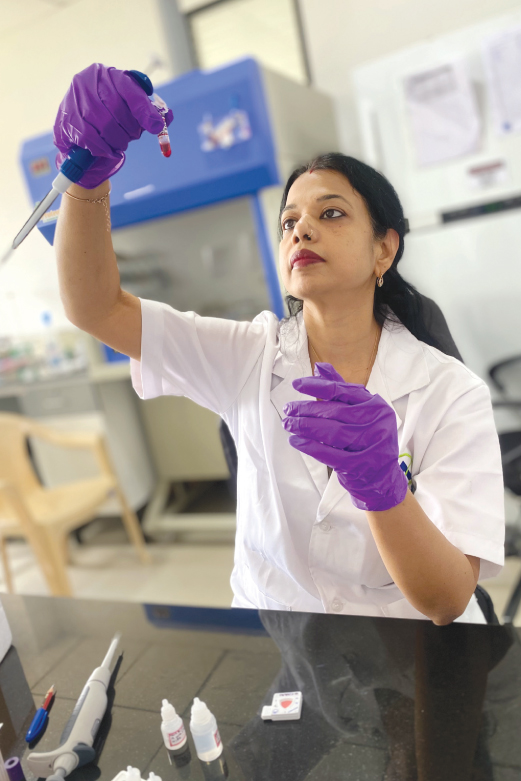Besting the testing
An affordable blood sample-based diagnosis that tracks four vector-borne diseases promises to be a boon for rural communities
It was a devastating incident that shaped Binita Shrivastava Tunga’s outlook towards her work.
The cofounder of Ameliorate Biotech, a Bengaluru-based science and tech-focussed startup, lost her 11-year-old niece in 2004. “She died because of a co-infection,” says Dr Binita. “She had contracted both dengue and malaria but only dengue was detected from tests. The malaria went undiagnosed and we only discovered it after her post-mortem was done.”
Dr Binita’s niece lived in Hyderabad and was being treated at one of the city’s best hospitals. “We lost her exactly seven days after the first diagnosis,” Dr Binita recalls. The first report, indicating dengue, came in three days and treatment was started immediately.
Bad to worse
“But she just wasn’t getting better. By the third day, her condition was so bad we had to shift her to another hospital,” says Dr Binita. “By then her platelet count had dropped drastically and, because of the malaria, many complications developed. Eventually it was multiple organ failure that caused her death.”
The tragedy had a huge impact on Dr Binita and her husband, Rashbehari, who cofounded Ameliorate Biotech, which has been funded and supported by the India Health Fund, an associate of the Tata Trusts.

“We could have saved her life if the diagnosis had been done properly and the co-infection detected,” says Dr Binita. Then, in 2007, an undiagnosed case of hepatitis claimed another member of her family. That’s when Dr Binita decided to look for life-saving solutions. “The death of my niece was the main reason we ventured into early-stage diagnostics,” she says.
Ameliorate Biotech has created an antigen-based test that can detect four ailments that have similar symptoms: malaria falciparum, malaria vivax, dengue and chikungunya. Called Assured — an acronym for affordable, specific, sensitive, rapid, equipment-free device — this test can generate results quickly and also flag co-infections. Launched in 2019, Assured is currently being tested at three government hospitals in Karnataka, Bihar and Andhra Pradesh.
The kit is simple. It requires a few drops of blood to be put on a ‘buffer’ (a solution) and, as with a pregnancy or a Covid home-test kit, lines will appear on a stick to indicate what the patient has contracted. “With an antigen-based test you can check a patient after just one day of fever,” says Dr Binita. “With an antibody test, you may have to wait for seven days.”
A quick diagnosis means the correct treatment can start immediately. And early-stage detection, as Dr Binita’s family has learned the hard way, can save lives. One big advantage with Assured is that it is a combo kit.
“We are differentiating from our competitors in providing these tests in one single device,” says Dr Binita. “So, if a person is suffering from two different infections at the same time, we should be able to diagnose them instantaneously instead of testing them one by one.” The doctor will have the reports for all four tests at the same time.
Tackling co-infections is critical. Typically, if a patient tests positive for, say, malaria, the physician will start her off on treatment. But no one thinks to check if she has anything else. It’s only when the result is negative that a battery of tests may follow.

According to Dr Binita, in India the prevalence of co-infections is higher than we think. “There are regions in Andhra Pradesh, Bihar and Delhi where co-infections are common. In 2021, reports from Delhi said that at least 35% of those diagnosed with dengue also had chikungunya,” she adds. “Sadly, many of these co-infections go undiagnosed.”
Assured advantage
Another advantage for Assured is that it doesn’t require laboratory support or a fully equipped facility (rapid diagnosis ensures that there is no need to store blood samples). Nor does it need trained personnel to conduct the test; just someone who can draw blood. “We could have made it a home-test kit if a finger-prick of blood was enough, but that’s not the case,” adds Dr Binita.
Assured is priced at ![]() 200 a kit, which is more than reasonable when compared with alternatives. Private hospitals charge
200 a kit, which is more than reasonable when compared with alternatives. Private hospitals charge ![]() 700-800 for a malaria test and
700-800 for a malaria test and ![]() 1,500 for chikungunya. The combination of tests required for a thorough investigation may cost up to
1,500 for chikungunya. The combination of tests required for a thorough investigation may cost up to ![]() 3,000.
3,000.
The price factor makes Assured a prime candidate for large-scale use in rural regions, particularly in remote healthcare centres. A 10-minute, multi-illness visual screening means patients get to know, during their first visit to the clinic, what they have (or don’t). Also, this is beneficial for patients who live far away from a primary healthcare centre, saving them money and effort on a second or third visit there.
The Ameliorate team is trying to improve various aspects of Assured. Its sensitivity and specificity, for instance, so that it can deliver pinpoint diagnosis. Future kits may have an AI component that will make diagnosis even more accurate and quick. There is also a plan to broaden the platform to include other ailments, notably Japanese encephalitis and Zika.
“We can extend this platform technology to create a more robust ‘fever panel’ test that will look beyond the current vector-borne diseases to airborne and respiratory illnesses such as Covid and influenza,” says Dr Binita. “There is a great need for that as well.”
